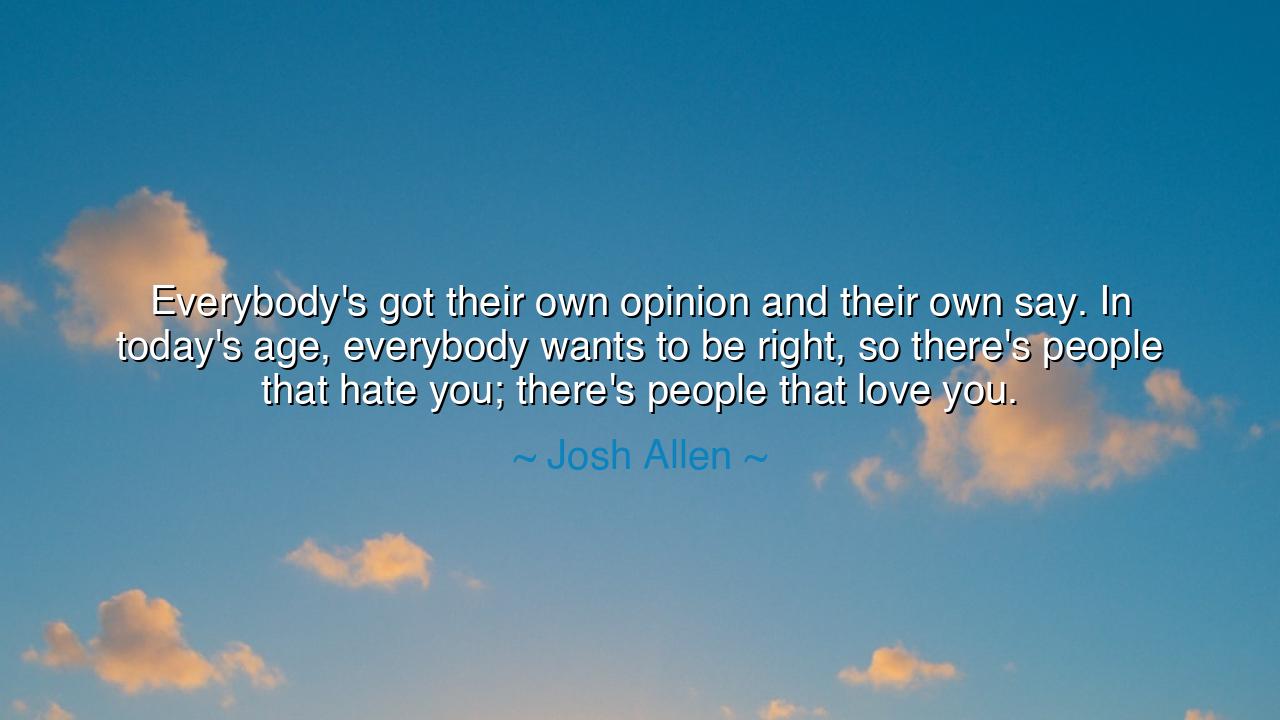
Everybody's got their own opinion and their own say. In today's
Everybody's got their own opinion and their own say. In today's age, everybody wants to be right, so there's people that hate you; there's people that love you.






In the vast arena of human existence, we often find ourselves amidst a cacophony of voices, each clamoring to be heard, each believing their truth is the one to be followed. Josh Allen, in his reflection on the modern world, captures this struggle perfectly when he says, "Everybody's got their own opinion and their own say. In today's age, everybody wants to be right, so there's people that hate you; there's people that love you." These words cut to the heart of a universal truth: in the age of instant communication and mass media, everyone is an expert, and everyone is entitled to their voice. Yet in this multitude of voices, we are often forced to confront the reality that to stand firm in our beliefs is to invite both praise and criticism in equal measure.
The ancients understood the power of opinion and the challenges that come with holding a belief in a world full of differing views. Socrates, the great philosopher, was perhaps the most famous example of someone whose beliefs were so radically different from the society around him that it led to his eventual execution. Despite being condemned, Socrates remained steadfast in his convictions, even knowing that his ideas would invite hatred from the very people he sought to teach. His willingness to stand firm in his beliefs, despite the consequences, speaks to the deep human experience—the tension between individual conviction and the demands of society. Josh Allen's words echo this tension in modern times: to be right in today’s world is to stand against an ocean of contrasting opinions.
We need only look at the story of Alexander the Great to understand the implications of having a say in a world where opinions abound. Alexander, a man of immense ambition and vision, led one of the greatest empires the world has ever known. But his rise to power was not without opposition. Everywhere he went, there were those who adored him and those who despised him. The same could be said of Caesar, whose actions transformed the Roman Republic but led to fierce animosity and assassination. These great leaders, though powerful, were shaped by the criticism of others, and their legacy is a reminder that even the most extraordinary individuals will face those who reject them, often just as fiercely as those who celebrate them.
But Socrates and Alexander are not alone in the history of human conflict between love and hate. Gandhi, the leader of India’s nonviolent struggle for independence, faced not only the admiration of millions but also intense opposition from those who disagreed with his methods. Yet, in all his struggles, Gandhi remained committed to his principles, knowing that the truth he stood for would always spark conflict. Josh Allen’s reflection on the duality of praise and criticism reveals a common truth: no matter what path we choose, we will encounter both love and hate, admiration and disdain.
As we look to the ancients, we see that this duality is part of the human condition. Plato, in his works, examined how people’s opinions are shaped by their environments, their desires, and their biases. To seek truth in such a world requires not just courage but the ability to withstand the opposition that comes with standing apart from the crowd. In today’s world, where social media amplifies every voice, this challenge is only magnified. To hold a position in such a fragmented society is to risk the consequences of division, where those who disagree with you will often rise in fierce opposition. Yet, as Josh Allen wisely observes, this is the price of living in a world where everyone is entitled to their own voice.
The lesson here is one of resilience and self-awareness. In a world where it is easy to be overwhelmed by the noise of conflicting opinions, we must learn to stay grounded in our own truth. As Socrates taught, the pursuit of truth is not about conforming to the opinions of others, but about engaging with the world in an honest and thoughtful way. Josh Allen’s reflection on hate and love serves as a reminder that no matter where we stand, there will always be criticism and praise, and our task is to endure both with grace. To stand for what we believe in, in the face of adversity, is the hallmark of strength and conviction.
In our own lives, we must learn to embrace the reality that opinions will always differ, but that should not deter us from speaking our truth. Just as the great philosophers, leaders, and warriors of the past stood firm in their beliefs, so too must we remain committed to what we hold to be right. Whether in the world of sports, politics, or personal relationships, the challenge of facing opposition will always be present. Yet, it is in how we respond to that opposition—with dignity, resilience, and a commitment to our truth—that we find our true strength. Let us be inspired by Socrates, Alexander, and Gandhi, who endured hatred and praise in equal measure, and let us walk the path of honesty and integrity, knowing that strength lies not in the absence of criticism, but in our ability to rise above it.






AAdministratorAdministrator
Welcome, honored guests. Please leave a comment, we will respond soon